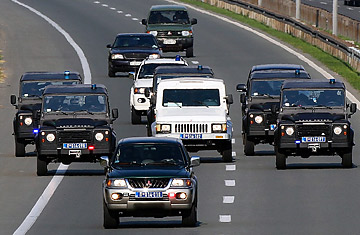
A police motorcade takes former Bosnian Serb general Ratko Mladic (in the white vehicle) to face genocide charges at the U.N. war crimes tribunal near the Belgrade airport in Belgrade, Serbia, on May 31, 2011
As they shut behind Ratko Mladic, the clanging metal doors of the Dutch prison in Scheveningen heralded an overdue victory for international justice and possibly a new beginning for Serbia. After spending more than a decade as one of the world's most wanted men, the Bosnian Serb general can finally be tried by the International Tribunal in the Hague — nearly 16 years after his indictment for the 1995 genocide in Srebrenica and other war crimes. He joins an old friend: Radovan Karadzic, the top Bosnian Serb civilian leader, who was arrested three years ago in Belgrade.
But many in Serbia see Mladic as a hero and a champion of Serb nationalism. The country is still deeply divided over its role in the 1992-95 war that began as the multi ethnic state of Bosnia and Herzegovina attempted to carve out its independence from the remains of Yugoslavia. Serbia, which retained the name Yugoslavia until 2003, was often accused of harboring Mladic and other indicted war criminals. On May 29, three days after Mladic's capture, more than 100 people were arrested and about a dozen injured during violent protests in Belgrade. T-shirts with the general's image and the word hero have always sold well in Serbia — and they were still being sold after his capture.
During the six days that Mladic spent waiting for extradition, he became the object of a media frenzy, with countless camera crews lined up in front of the special war-crimes court, where he was detained in a 10-sq-m cell. Every detail was devoured by the press: his requests for strawberries, his favorite books (by Russian authors Tolstoy and Turgenev) and a television set; his insistence on visiting the grave of his daughter Ana, who committed suicide in 1994 with her father's favorite gun. All of these wishes were granted, although the visit to the cemetery posed a major security risk. When Serbian officials initially said the last request might not be fulfilled, Mladic reportedly asked for his daughter's coffin to be brought to his cell. "How about bringing him 8,000 coffins from Srebrenica," huffs Jelena Milic, director of Belgrade's Center for Euroatlantic Studies, a think tank.
Serb nationalist pride in Mladic is one thing. The failure to apprehend him, however, had become an immense foreign policy problem for Belgrade. It was the biggest roadblock to Serbia's candidacy for membership in the European Union. For Boris Tadic, Serbia's pro-Western President, the horns of the dilemma were: find and deliver Mladic and risk popular anger or fail to do so and almost certainly lose the next election because of his inability to get the E.U. candidacy. "We arrested [Mladic] the moment we discovered him," Tadic told the Associated Press, dismissing rumors that the government had for months known Mladic's whereabouts but delayed his arrest in order to avoid a nationalist backlash.
According to the official version of events, Mladic was arrested at the break of dawn on May 26 in the small village of Knezevo, some 100 km north of the capital, in the house of Branko Mladic, a relative. Although armed with two handguns, Mladic, now 68, offered no resistance. Instead, security officials say, he greeted his captors, saying, "Congratulations, you have found the one you're looking for." Once a burly, intimidating figure, the general had become a pale, emaciated version of his former self: he visibly limped while walking into the Belgrade court in the company of guards. His right hand was partly paralyzed after two minor strokes he suffered in recent years, and he has several age-related diseases. However, attempts by Mladic's lawyer to delay the extradition by claiming that his client suffers from dementia and is too sick to travel were dismissed by the court doctors, who declared him sane and fit to stand trial.
In the Hague, Mladic faces a freshly amended indictment accusing him of directing the massacre in Srebrenica, a U.N.-declared "safe zone" where his troops killed every male Bosnian Muslim over the age of 15 they could lay their hands on. Mladic will also answer for the relentless bombardment of Sarajevo as well as a series of ethnic-cleansing campaigns in Bosnia. Although some have suggested that Mladic's trial be combined with that of Karadzic, which began in April 2010, prosecutors say that is unlikely to happen. "It's really too early to say how the trial will be organized, in what kind of context," Serge Brammertz, the tribunal's Belgian chief prosecutor, told the Sense News Agency in the Hague.
For President Tadic, meanwhile, there's an agonizing wait to see if the arrest of Mladic will produce the reward he so desires. "I simply ask the E.U. to fulfill its part," he told the Associated Press. "We fulfilled our part, and we will continue to do so." Thus far, though, all he has received are congratulatory messages from world leaders — including U.S. President Barack Obama and U.N. Secretary-General Ban Ki-moon, among others — and some encouraging voices from E.U. analysts. "The arrest [of Mladic] is a highly symbolic marker that Serbia is now a normal state, prepared to enforce European values," says Greg Austin, vice president of the EastWest Institute, a Brussels think tank.
